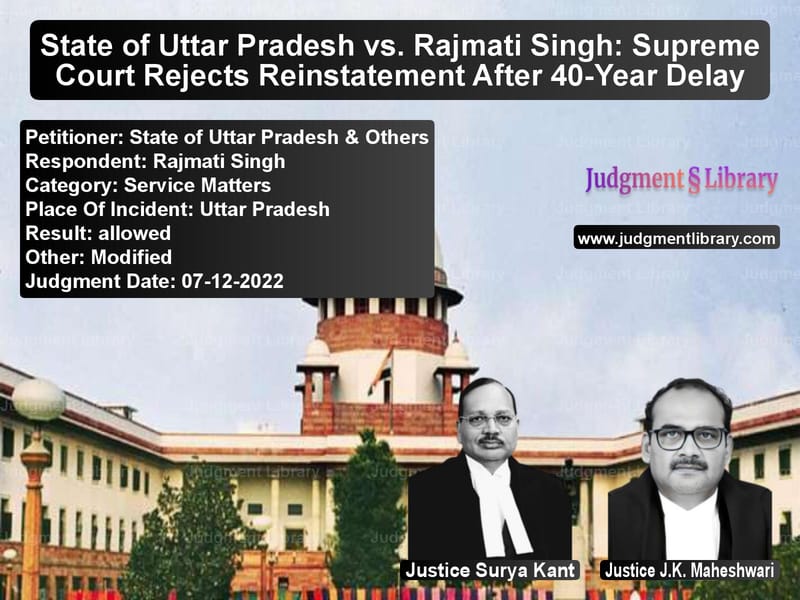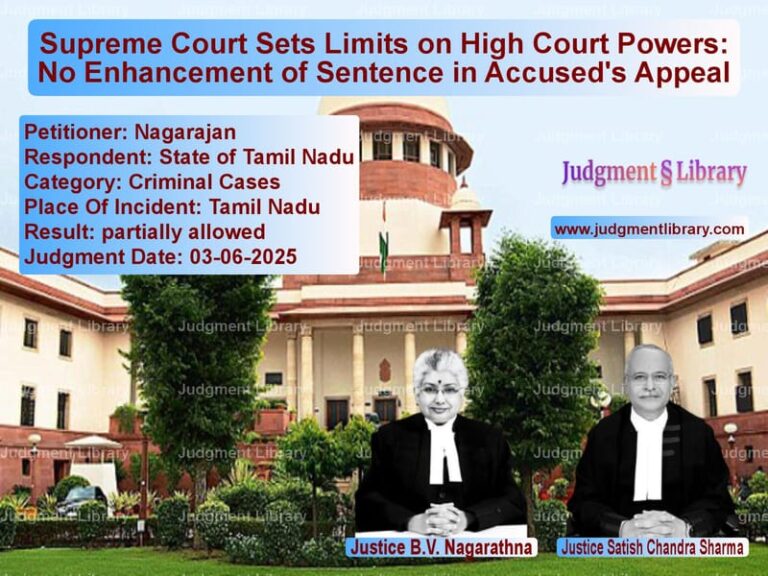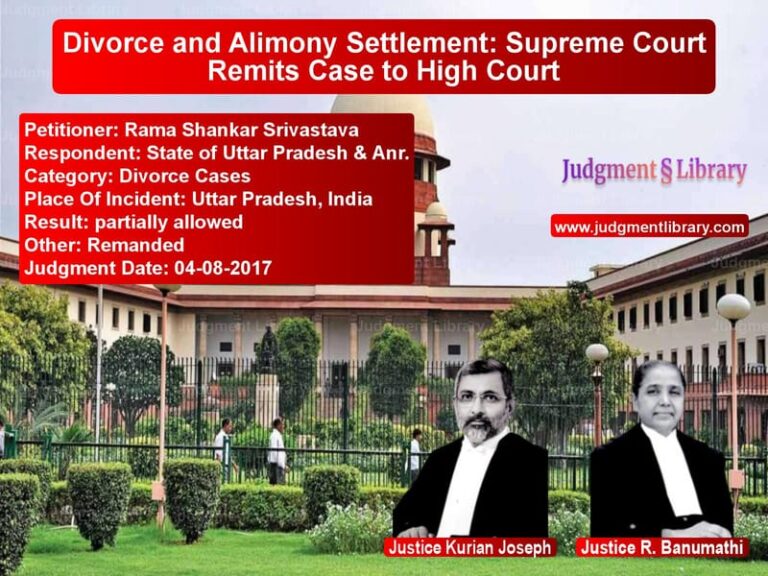State of Uttar Pradesh vs. Rajmati Singh: Supreme Court Rejects Reinstatement After 40-Year Delay
The Supreme Court of India, in its judgment dated December 7, 2022, in the case of State of Uttar Pradesh vs. Rajmati Singh, ruled against the reinstatement of a teacher who had not worked for nearly four decades. The Court overturned the Allahabad High Court’s decision, which had granted the respondent continuity in service and all consequential benefits, including salary. Instead, the Supreme Court awarded a lump sum compensation of Rs. 5,00,000 to the respondent.
Background of the Case
The respondent, Rajmati Singh, was appointed as an untrained Assistant Teacher on January 28, 1971, in Kanya Karmottar Junior High School, Gaura, Rai Bareli. She was relieved from her post on August 4, 1973, to undergo the Basic Training Course (BTC), a requirement to continue in service. However, instead of obtaining the BTC certification, she presented a B.Ed. certificate, which was not accepted as an alternative qualification. Consequently, she was not permitted to resume her duties in 1974, and her contractual employment effectively ended without a formal termination order.
After several decades of making representations to the authorities, she approached the State Information Commission in 2009, seeking information about her employment status. This led to a communication from the District Basic Education Officer in 2009 explaining her case history but did not offer any fresh decision on her reinstatement. Treating this communication as a rejection, she filed a petition before the State Public Services Tribunal in 2010, which was dismissed as time-barred. The respondent then challenged this dismissal before the Allahabad High Court, which ultimately ruled in her favor, leading to an appeal by the State of Uttar Pradesh before the Supreme Court.
Arguments Presented
Petitioners’ (State of Uttar Pradesh) Arguments
The State of Uttar Pradesh, represented by its counsel, argued:
- The claim was excessively delayed, as the respondent had not worked since 1974 and had only approached a judicial forum in 2010.
- The respondent did not possess the required BTC qualification, and her employment had effectively ended as per departmental instructions.
- The State Information Commission’s directive in 2009 merely led to a historical explanation and did not amount to a reconsideration of her employment.
- The High Court erred in granting her reinstatement after an unreasonable delay of more than 40 years.
Respondent’s (Rajmati Singh) Arguments
The respondent, represented by her counsel, countered with the following points:
- She was never formally terminated from service, and thus her employment should be deemed continuous.
- The authorities failed to respond to her representations for decades, effectively denying her a fair hearing.
- The High Court correctly ruled in her favor based on equity and natural justice.
Supreme Court’s Observations
The Supreme Court reviewed the case and held:
- “A person cannot remain silent for decades and suddenly claim reinstatement along with full salary and benefits. The claim is grossly delayed and legally unsustainable.”
- “Repeated representations do not revive a stale claim, nor do they extend the limitation period for seeking legal remedy.”
- “The respondent had waived her right to challenge her non-continuation in service by failing to approach a judicial or quasi-judicial forum for over 40 years.”
- “The State Information Commission is not a forum for adjudicating service disputes, and its directive did not provide any fresh cause of action for the respondent.”
Judgment and Ruling
The Supreme Court ruled in favor of the State of Uttar Pradesh with the following key directions:
- The Allahabad High Court’s judgment was quashed and set aside.
- The respondent’s claim for reinstatement, back wages, and pension benefits was rejected.
- The State of Uttar Pradesh was directed to pay a lump sum compensation of Rs. 5,00,000 to the respondent within two months.
Implications of the Judgment
This ruling has significant implications for service law and employment disputes:
- Reaffirmation of Limitation Principles: The Court emphasized that service-related claims must be raised within a reasonable timeframe and cannot be revived after decades.
- Protection of Public Exchequer: The decision prevents undue financial burdens on the government by discouraging stale claims for salaries and pensions.
- Proper Use of Judicial Forums: The ruling clarifies that administrative bodies like the State Information Commission cannot be used as a substitute for legal remedies in service disputes.
Conclusion
The Supreme Court’s ruling in State of Uttar Pradesh vs. Rajmati Singh reinforces the principle that employment disputes must be raised in a timely manner. By rejecting the claim for reinstatement after a 40-year delay, the Court has upheld the principles of limitation and administrative discipline. However, by awarding compensation, it has also ensured a measure of equity in the case. This judgment serves as an important precedent for similar service-related disputes in India.
Petitioner Name: State of Uttar Pradesh & Others.Respondent Name: Rajmati Singh.Judgment By: Justice Surya Kant, Justice J.K. Maheshwari.Place Of Incident: Uttar Pradesh.Judgment Date: 07-12-2022.
Don’t miss out on the full details! Download the complete judgment in PDF format below and gain valuable insights instantly!
Download Judgment: state-of-uttar-prade-vs-rajmati-singh-supreme-court-of-india-judgment-dated-07-12-2022.pdf
Directly Download Judgment: Directly download this Judgment
See all petitions in Employment Disputes
See all petitions in Public Sector Employees
See all petitions in Termination Cases
See all petitions in Judgment by Surya Kant
See all petitions in Judgment by J.K. Maheshwari
See all petitions in allowed
See all petitions in Modified
See all petitions in supreme court of India judgments December 2022
See all petitions in 2022 judgments
See all posts in Service Matters Category
See all allowed petitions in Service Matters Category
See all Dismissed petitions in Service Matters Category
See all partially allowed petitions in Service Matters Category







